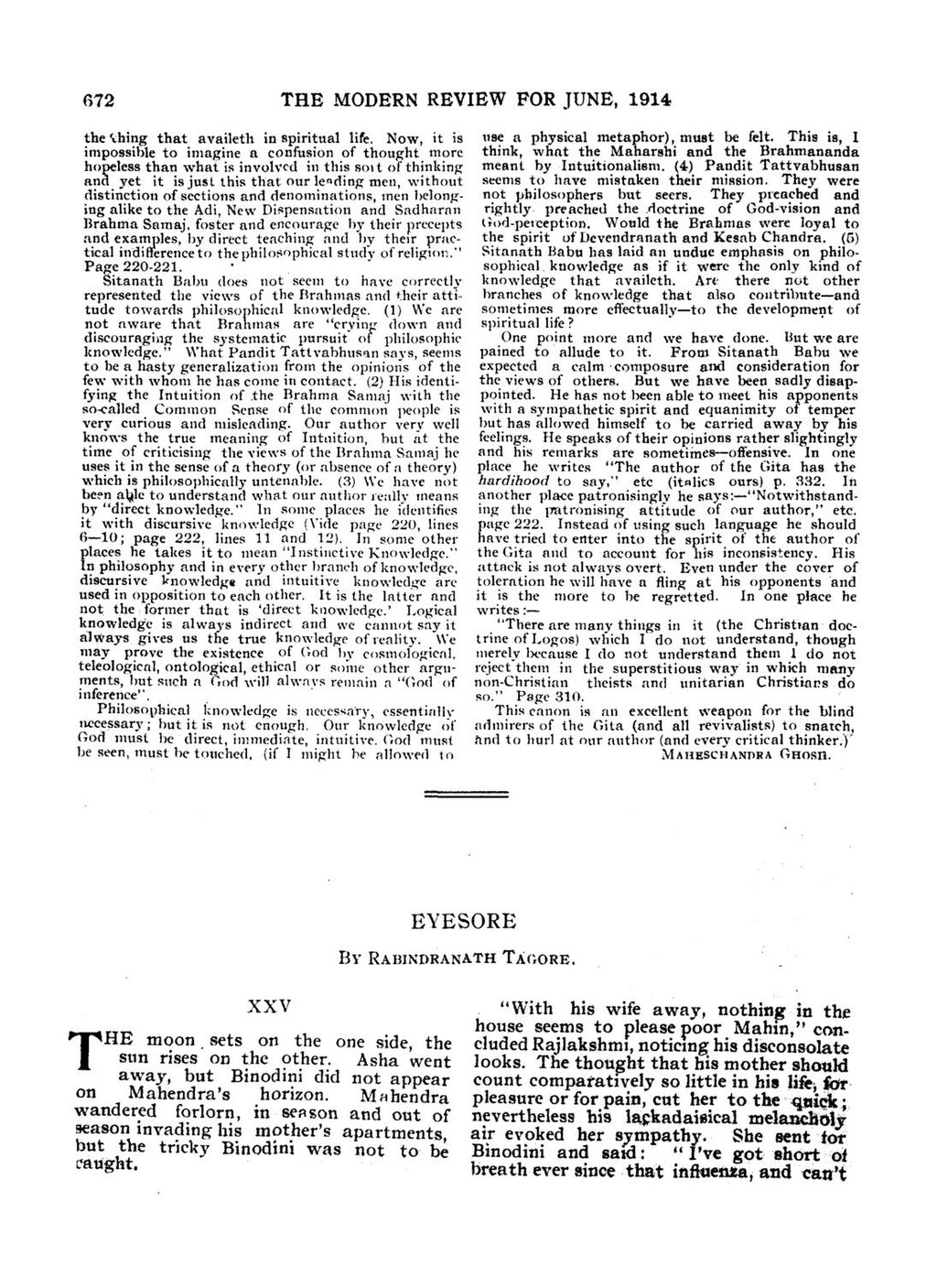the thing that availeth in spiritual life. Now, it is impossible to imagine a confusion of thought more hopeless than what is involved in this sort of thinking and yet it is just this that our leading men, without distinction of sections and denominations, men belonging alike to the Adi, New Dispensation and Sadharan Brahma Samaj, foster and encourage by their precepts and examples, by direct teaching and by their practical indifference to the philosophical study of religion." Page 220-221.
Sitanath Babu does not seem to have correctly represented the views of the Brahmas and their attitude towards philosophical knowledge. (1) We are not aware that Brahmas are "crying down and discouraging the systematic pursuit of philosophic knowledge." What Pandit Tattvabhusan says, seems to be a hasty generalization from the opinions of the few with whom he has come in contact. (2) His identifying of the Intuition of the Brahma Samaj with the so-called Common Sense of the common people is very curious and misleading. Our author very well knows the true meaning of Intuition, but at the time of criticising the views of the Brahma Samaj he uses it in the sense of a theory (or absence of a theory) which is philosophically untenable. (3) We have not been able to understand what our author really means by "direct knowledge." In some places he identifies it with discursive knowledge (Vide page 220, lines 6-10; page 222, lines 11 and 12). In some other places he takes it to mean "Instinctive Knowledge." In philosophy and in every other branch of knowledge, discursive knowledge und intuitive knowledge are used in opposition to each other. It is the latter and not the former that is 'direct knowledge.' Logical knowledge is always indirect and we cannot say it always gives us the true knowledge of reality. We may prove the existence of God by cosmological, teleological, ontological, ethical or some other arguments, but such a God will always remain a "God of inference".
Philosophical knowledge is necessary, essentially necessary; but it is not enough. Our knowledge of God must be direct, immediate, intuitive. God must be seen, must be touched, (if I might be allowed to use a physical metaphor), must be felt. This is, I think, what the Maharshi and the Brahmananda meant by Intuitionalism. (4) Pandit Tattvabhusan seems to have mistaken their mission. They were not philosophers but seers. They preached and rightly preached the doctrine of God-vision and God-perception. Would the Brahmas were loyal to the spirit of Devendranath and Kesab Chandra. (5) Sitanath Babu has laid an undue emphasis on philosophical knowledge as if it were the only kind of knowledge that availeth. Are there not other branches of knowledge that also contribute—and sometimes more effectually—to the development of spiritual life?
One point more and we have done. But we are pained to allude to it. From Sitanath Babu we expected a calm composure and consideration for the views of others. But we have been sadly disappointed. He has not been able to meet his apponents with a sympathetic spirit and equanimity of temper but has allowed himself to be carried away by his feelings. He speaks of their opinions rather slightingly and his remarks are sometimes—offensive. In one place he writes "The author of the Gita has the hardihood to say," etc. (italics ours) p. 332. In another place patronisingly he says:—"Notwithstanding the patronising attitude of our author," etc. page 222. Instead of using such language he should have tried to enter into the spirit of the author of the Gita and to account for his inconsistency. His attack is not always overt. Even under the cover of toleration he will have a fling at his opponents and it is the more to be regretted. In one place he writes:—
"There are many things in it (the Christian doctrine of Logos) which I do not understand, though merely because I do not understand them I do not reject them in the superstitious way in which many non-Christian theists and unitarian Christians do so." Page 310.
This canon is an excellent weapon for the blind admirers of the Gita (and all revivalists) to snatch, and to hurl at our author (and every critical thinker.)
EYESORE
By Rabindranath Tagore.
XXV
THE moon sets on the one side, the sun rises on the other. Asha went away, but Binodini did not appear on Mahendra's horizon. Mahendra wandered forlorn, in season and out of season invading his mother's apartments, but the tricky Binodini was not to be caught.
"With his wife away, nothing in the house seems to please poor Mahin," concluded Rajlakshmi, noticing his disconsolate looks. The thought that his mother should count comparatively so little in his life, for pleasure or for pain, cut her to the quick; nevertheless his lackadaisical melancholy air evoked her sympathy. She sent for Binodini and said: "I've got short of breath ever since that influenza, and can't
